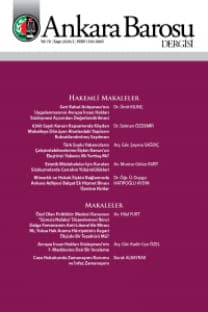Kamu Denetçiliği (Ombudsmanlık) ve Anayasa Mahkemesine Bireysel Başvuru Hakkı
Kamu denetçisi, yapılan haksızlıkları ortaya koymak, takdir yetkisinin kötüye kullanılmasını engellemek, mevzuata saygılı olmayı ve uygun hareket etmeyi sağlamak, hakkaniyet önlemlerini tavsiye etmek ve kamu hizmetlerinin daha iyi görülmesi için gerekli reformların yapılması önerilerinde bulunmak amaçlarını güden, Parlamento tarafından seçilmiş, kimsenin telkin ima ve tavsiyede bulunamadığı bağımsız bir kamu görevlisidir. Anayasa Mahkemesine bireysel başvuru ise, kamu gücünün işlem, eylem veya ihmali nedeniyle temel hak ve özgürlükleri ihlal edilen bireylerin hukuk yollarını tükettikten sonra başvurdukları istisnai, olağanüstü ve ikincil nitelikte bir hak arama yoludur. Bu iki kurumun benzer ve farklı yönleri vardır. Bunlardan en önemlisi kamu denetçisinin yaptırım gücü olmadığı halde, bireysel başvuruda tazminat ve tedbir kararı da dâhil olmak üzere her tür kararın verilebilmesidir
Anahtar Kelimeler:
Ombudsmanlık, Kamu Denetçiliği, Anayasa Şikâyeti, Bireysel Başvuru, İnsan Hakları
Public Auditorship (Ombudsm anship) and Right to Constitutional Complaint to the Constitutional Court
Ombudsman is an independent public official to clear injustices, to prevent improper use of law, be respectful of law and to comply with the legislation, to ensure fairness and to recommend measures deemed necessary for better public services. He/she is elected by the Parliament, and no body is allowed to give any orders, suggestions and recommendations to him/her. Individual application to the Constitutional Court, on the other hand, is a way to seek ‘right’ as an exceptional extraordinary procedure that individuals can apply only after exhaustion of domestic remedies, in case state power violates the individual’s fundamental rights and freedoms. There are similarities as well as differences between these two institutions. Most importantly, Ombudsman has no power to impose sanctions, but Court can decide compensation and any type of injunction due to individual application.
Keywords:
Ombudsmanship, Public Auditorship, Constitution Complaint, Individual Application, Human Rights.,
- ISSN: 1300-9885
- Yayın Aralığı: Yılda 4 Sayı
- Başlangıç: 1942
- Yayıncı: Ankara Barosu Başkanlığı
